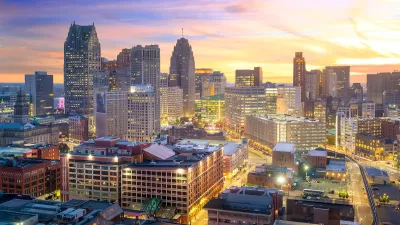John Gallagher provides an update on the elements being considered for remaking the city's neighborhoods by Mayor Dave Bing's Detroit Works long-term planning team.
Urban farms, gardens, and reforestation are among the menu of options being considered for Detroit's vacant properties and underutilized neighborhoods by the Detroit Works technical team.
According to Gallagher, "Some areas, such as the city's Indian Village or Palmer Woods
neighborhoods, might continue to thrive as areas of single-family
residences. Other districts suffering considerable vacancy might
transition to what the team calls 'green residential,' a mix of homes
and small community gardens or parks. Still
other neighborhoods that are almost entirely abandoned might be used
for reforestation or experimental fields where sunflowers and other
plants could be used to detoxify contaminated land."
"But some skepticism remained about how many of the good ideas will
become policy in the cash-strapped city, and how many might ever be
carried out."
"The team is expected to produce a final report by late summer, offering
options for residents and civic leaders to consider rather than strict
recommendations about what should happen where."
FULL STORY: Urban farms, gardens, reforestation all part of Detroit Works vision for remaking city

Planetizen Federal Action Tracker
A weekly monitor of how Trump’s orders and actions are impacting planners and planning in America.

Maui's Vacation Rental Debate Turns Ugly
Verbal attacks, misinformation campaigns and fistfights plague a high-stakes debate to convert thousands of vacation rentals into long-term housing.

San Francisco Suspends Traffic Calming Amidst Record Deaths
Citing “a challenging fiscal landscape,” the city will cease the program on the heels of 42 traffic deaths, including 24 pedestrians.

Amtrak Rolls Out New Orleans to Alabama “Mardi Gras” Train
The new service will operate morning and evening departures between Mobile and New Orleans.

The Subversive Car-Free Guide to Trump's Great American Road Trip
Car-free ways to access Chicagoland’s best tourist attractions.

San Antonio and Austin are Fusing Into one Massive Megaregion
The region spanning the two central Texas cities is growing fast, posing challenges for local infrastructure and water supplies.
Urban Design for Planners 1: Software Tools
This six-course series explores essential urban design concepts using open source software and equips planners with the tools they need to participate fully in the urban design process.
Planning for Universal Design
Learn the tools for implementing Universal Design in planning regulations.
Heyer Gruel & Associates PA
JM Goldson LLC
Custer County Colorado
City of Camden Redevelopment Agency
City of Astoria
Transportation Research & Education Center (TREC) at Portland State University
Jefferson Parish Government
Camden Redevelopment Agency
City of Claremont




























